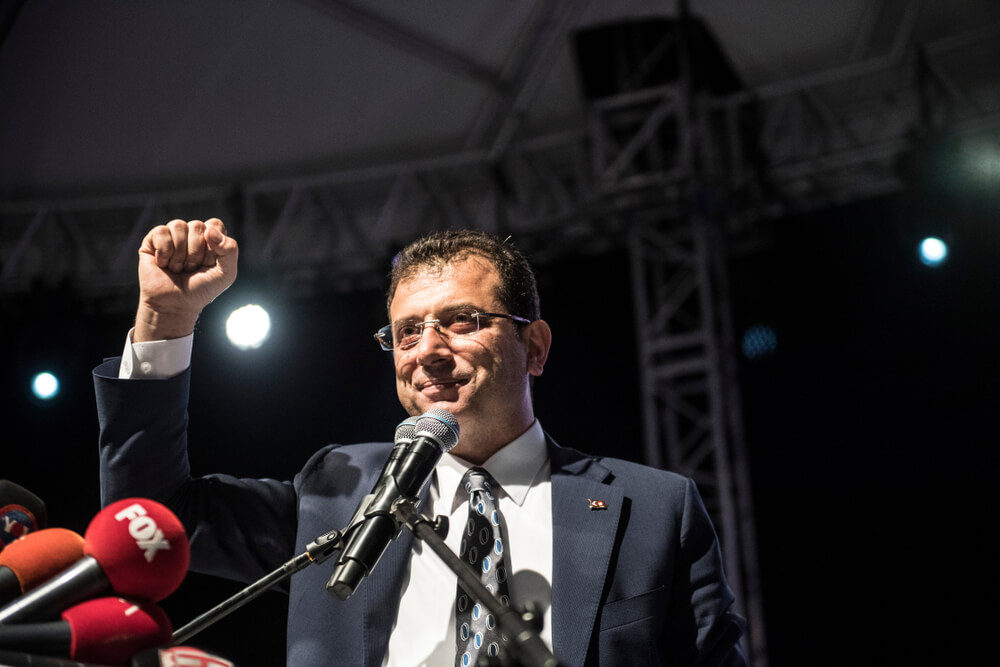Turkish President Recep Tayyip Erdoğan caused quite a stir when he recently said that the forthcoming local elections were also his last.
"I am working non-stop. We're running around breathlessly because, for me, it's a final. With the authority that the law confers on me, this election is my last election," he said at a pre-election rally with the Turkish Youth Foundation.
Even though Erdoğan's statement might have sounded like a significant turning point after more than 20 years of rule, it was not.
After winning a second presidential term last year, Mr Erdoğan can no longer be president according to the Constitution.
The fact that he declared the local elections on March 31 to be the last where he will be an active participant does not change the fact that he will manage Turkish politics until 2028 when his mandate will expire.
Mobilisation of voters
The experienced Turkish leader has carefully chosen the time and the place to talk about his departure, even though it will not happen very soon. He spoke at a meeting with young people a few weeks before the elections in which around 65 million Turks will elect their local authorities.
His words are part of the Justice and Development Party's (AKP) voter mobilisation strategy, where he has invested his personal authority because the stakes in the forthcoming elections are high.
The importance of the elections in 2 weeks goes beyond the local framework
President Erdoğan started the campaign for the forthcoming local elections on the very first day after winning a new presidential mandate on May 28 last year.
Even then, in a celebratory atmosphere in Istanbul, he spoke about the "distant" March 2024 and local elections, asking his followers "not to stop and to work hard" to regain power in Istanbul.
That is why the importance of the elections in 2 weeks goes beyond the local framework, given that they significantly affect the overall Turkish political scene.
A tight race in Istanbul
Erdoğan's AKP party prioritises restoring power in Istanbul and Ankara, where they were defeated in 2019 after 15 years of rule. However, the AKP's objectives extend beyond triumph in 2 crucial Turkish towns; it seeks to govern the entire country.
In Istanbul, where both sides invest the most in the election campaign, the prospects are very even.
At the beginning of March, current mayor Ekrem İmamoğlu had a slight lead, supported by around 41.5% of citizens, while AKP candidate Murat Kurum followed with around 40%. Other polls show similar results.
İmamoğlu’s election as an opposition candidate in 2019 dealt a stinging blow to Erdoğan and his party.
The reason is not just that it pointed to the diminishing popularity of the ruling AKP but also that the Turkish leader personally tasted defeat, having served as mayor of Istanbul in the 1990s when his political climb began.
However, the opposition's takeover of Istanbul and Ankara did not signal the end of the Erdoğan era. On the contrary, his victory over the united opposition candidate last year and the AKP's decisive victory in the parliamentary elections bolstered their standing.
At the same time, the defeat of the opposition has led to its decline since May 2023. The former allies will not be united at the March 31 elections, as they were last year.
 The opposition parties have failed to maintain a minimum of unity in the previous 10 months, and they are now going to the polls divided - Ekrem Imamoglu
The opposition parties have failed to maintain a minimum of unity in the previous 10 months, and they are now going to the polls divided - Ekrem Imamoglu
Disappointed by the defeat at the time, and after the difficult-to-achieve unity, the opposition parties have failed to maintain a minimum of unity in the previous 10 months, and they are now going to the polls divided.
Their campaign is more a sign of mutual confrontations than criticism of their shared rival - the AKP. The largest of them, İmamoğlu's centre-left Republican People's Party (CHP), did not have a complete list of candidates 3 weeks before the elections.
İmamoğlu’s prospects for a new mandate have been reduced drastically by the cancellation of support by the pro-Kurdish DEM party and the nationalist IYI party, which supported him 5 years ago but are now going to the elections with their own candidates.
Preparations for a peaceful transition
As much as the united participation of the opposition in last year's presidential elections was the biggest problem for Erdoğan, now their disunity is the president's biggest trump card.
A good result on March 31 for Erdoğan and his AKP will not only mean returning to power in crucial cities, thus rounding off the influence on the country's political currents.
The elections will be a significant step towards the overall transition of influence within the AKP during the next few years of Erdoğan's undisputed authority.
The candidacy of 47-year-old engineer Murat Kurum for mayor of Istanbul suggests a strategy of rejuvenation at the top of the Turkish establishmen
His comment that these elections are also the last suggests that he wants to manage the internal transition processes, and for them to operate smoothly, a new success, namely in the local elections, is required.
In this respect, the candidacy of 47-year-old engineer Murat Kurum for mayor of Istanbul suggests a strategy of rejuvenation at the top of the Turkish establishment.
At the same time, his experience as a Member of Parliament and Minister of Environment and Urbanisation (2018-2023) means that the main levers of influence remain reserved for loyal politicians proven at their work at the top of the administration.